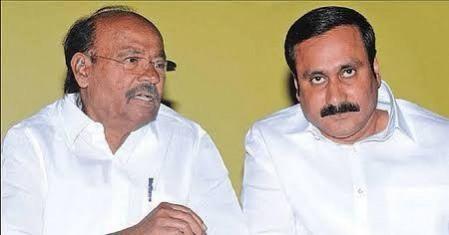
In a surprising turn of events, the Pattali Makkal Katchi (PMK) has witnessed a significant leadership shake-up. The party's founder, S. Ramadoss, has removed his son, Anbumani Ramadoss, from the executive committee. This decision, announced on July 6, has sent ripples through Tamil Nadu's political landscape, highlighting a deepening rift within the party's leadership. The executive committee, based in Tindivanam, was pivotal in the party's decision-making processes and included senior leaders like Thilagapama, Balu, Venkateswaran, and Vadivel Ravanan.
The dissolution of the committee effectively sidelines all its members, including Anbumani, who has been serving as the party president. While no official reason has been provided, insiders suggest that the move stems from growing differences between S. Ramadoss and his son over leadership style, candidate selection, and alliance strategies. Anbumani has been advocating for a modern and pragmatic political approach, which reportedly clashed with the traditionalist views of the party's founding leadership.
Over the past year, tensions have been simmering within the PMK, with insiders pointing to strained communications and diverging public positions on major political developments. Anbumani's increasing assertiveness, particularly his outreach to youth and focus on health, education, and governance reforms, has reportedly not been well-received by some members of the old guard, who felt sidelined. This internal conflict reached a tipping point after a recent high-level meeting in Tindivanam, where differing visions for the party's future reportedly led to heated arguments.
Internal strife
The PMK, founded in 1989 by S. Ramadoss, has a history of navigating internal conflicts and leadership challenges. The party has been a significant player in Tamil Nadu politics, often aligning with larger national parties to form coalitions. Its support base primarily consists of the Vanniyar community, one of the largest and most influential communities in the state. Over the years, the PMK has been known for its strong stance on social justice issues and its advocacy for the rights of the Vanniyar community.
Villupuram, Tamil Nadu: PMK founder Dr. Ramadoss clarified that Anbumani Ramadoss has no authority to remove party members, including Salem MLA Arul, stating that only he holds that power. On alliances, he said decisions will be made after consulting the party’s executive bodies,… pic.twitter.com/oKiUZjoIqI
— IANS (@ians_india) July 3, 2025
This is not the first time the PMK has faced internal strife. In the past, the party has witnessed several leadership tussles and ideological clashes. However, the current rift between S. Ramadoss and Anbumani is particularly significant given the latter's role as the party president and his efforts to modernize the party's approach. Anbumani, a former Union Health Minister, has been a prominent face of the PMK, known for his focus on health and education reforms. His vision for the party includes a broader appeal beyond the Vanniyar community, aiming to attract younger voters and address contemporary issues.
The removal of Anbumani from the executive committee raises questions about the future leadership of the PMK. With the 2026 Assembly elections approaching, the party's ability to present a united front will be crucial. The dissolution of the executive committee could lead to further internal divisions, as party cadres across Tamil Nadu are reportedly shocked by the development. It remains to be seen how Anbumani Ramadoss will respond to this unexpected political setback and whether he will continue to play a role in the party's future.
The removal of Anbumani Ramadoss from the PMK's executive committee marks a significant turning point for the party. It highlights the challenges of leadership transitions and ideological differences within political parties. As the PMK navigates this critical period, its ability to reconcile internal differences and present a united front will be crucial to its success in the upcoming elections. The party's future will depend on its ability to adapt to changing political dynamics while staying true to its core values and support base.








